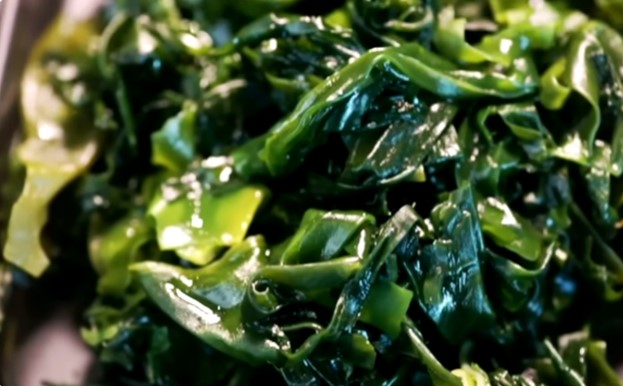Seaweed Nutrition Facts
Seaweed is a highly nutritious and versatile ingredient, often associated with Asian cuisine but increasingly popular worldwide due to its numerous health benefits. Let’s dive into the nutritional profile and health benefits of seaweed to understand why this ocean vegetable is becoming a staple in many diets.

Introduction
Seaweed, a nutrient-dense food harvested from the ocean, has been consumed for centuries, particularly in Asian countries such as Japan, Korea, and China. It is renowned for its rich content of vitamins, minerals, and antioxidants, which contribute to various health benefits. From improving thyroid function to providing essential nutrients for glowing skin and healthy bones, seaweed is a powerhouse of nutrition. Incorporating seaweed into your diet can offer a plethora of health benefits, making it a valuable addition to your meals. Whether you are looking to boost your energy, support your thyroid health, or enhance your overall well-being, seaweed can be a versatile and nutritious option. Read on to discover the detailed nutritional facts and health benefits of seaweed, and learn how this superfood can contribute to a healthier lifestyle.
Nutritional Profile of Seaweed
Macronutrients
- Calories: Low in calories, making it a great addition to weight management diets.
- Protein: A good source of plant-based protein.
- Fat: Very low in fat.
- Carbohydrates: Contains dietary fiber, which aids in digestion.
Vitamins and Minerals
- Vitamin A: Supports vision and immune function.
- Vitamin C: Important for skin health and immune function.
- Vitamin K: Essential for blood clotting and bone health.
- Folate: Important for DNA synthesis and repair.
- Calcium: Vital for bone health.
- Iron: Necessary for oxygen transport in the blood.
- Magnesium: Involved in over 300 biochemical reactions in the body.
- Potassium: Crucial for heart and muscle function.
- Iodine: Essential for thyroid function.
Antioxidants
Seaweed is rich in antioxidants such as vitamins A, C, and E, as well as unique compounds like fucoxanthin, which help protect cells from damage caused by free radicals.
Types of Seaweed and Their Nutritional Content
| Nutrient | Dried Spirulina (per 1 Tbsp) | Dried Spirulina (per 1 Cup) |
|---|---|---|
| Fiber | 0.25 g | 4.03 g |
| Calcium | 8.4 mg | 134 mg |
| Iron | 2 mg | 31.9 mg |
| Magnesium | 13.6 mg | 218 mg |
| Potassium | 95.2 mg | 1,520 mg |
| Sodium | 73.5 mg | 1,180 mg |
| Vitamin C | 0.707 mg | 11.3 mg |
| Folate | 6.58 mcg | 105 mcg |
| Vitamin A | 39.9 IU | 638 IU |
| Fatty Acids | 0.185 g | 2.97 g |
Health Benefits of Seaweed
Supports Thyroid Health
Seaweed is an excellent source of iodine, a mineral essential for the production of thyroid hormones. These hormones regulate metabolism, growth, and development. However, it’s important to consume seaweed in moderation, as excessive iodine intake can negatively impact thyroid function.
Promotes Heart Health
The high fiber content in seaweed can help lower cholesterol levels, reducing the risk of heart disease. Some studies suggest that seaweed may also help lower blood pressure and improve blood lipid profiles.
Enhances Digestive Health
Seaweed contains both soluble and insoluble fiber, which aid in digestion and promote a healthy gut microbiome. The fiber in seaweed can help prevent constipation and promote regular bowel movements.
Provides Antioxidant Protection
The antioxidants in seaweed help combat oxidative stress, which is linked to chronic diseases such as cancer and heart disease. These antioxidants protect cells from damage and support overall health.
Bone Health
Seaweed is rich in calcium, magnesium, and other minerals that are vital for maintaining strong and healthy bones. Regular consumption of seaweed can help prevent bone-related disorders such as osteoporosis.
Skin and Hair Health
The vitamins and minerals in seaweed, particularly vitamins A and C, support healthy skin and hair. Seaweed can help improve skin hydration, elasticity, and overall appearance.
Weight Management
The fiber in seaweed can help you feel full longer, reducing overall calorie intake. Seaweed is low in calories but high in essential nutrients, making it an excellent addition to weight loss diets.

Frequently Asked Questions
What are the different types of seaweed?
There are several types of seaweed, including nori, kelp, dulse, spirulina, and chlorella. Each type has a unique nutritional profile and can be used in different culinary applications.
How much seaweed should I eat daily?
While seaweed is highly nutritious, it’s best to consume it in moderation due to its high iodine content. Eating seaweed a few times a week is generally safe for most people. Consult with a healthcare provider for personalized recommendations.
Can seaweed help with weight loss?
Yes, seaweed can aid in weight loss due to its high fiber content, which promotes satiety and reduces overall calorie intake. Additionally, seaweed is low in calories and packed with essential nutrients.
Is seaweed safe for everyone?
While seaweed is generally safe for most people, individuals with thyroid conditions or those who are pregnant should consult a healthcare provider before adding large amounts of seaweed to their diet. Excessive iodine intake can negatively impact thyroid health.
How can I incorporate seaweed into my diet?
Seaweed can be added to soups, salads, smoothies, and sushi. It can also be enjoyed as a snack in the form of seaweed chips or roasted seaweed sheets.
By incorporating seaweed into your diet, you can enjoy its numerous health benefits while adding a unique and nutritious ingredient to your meals. Always remember to consume seaweed in moderation and consult a healthcare provider if you have any concerns about your iodine intake or overall health.





